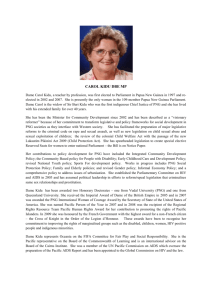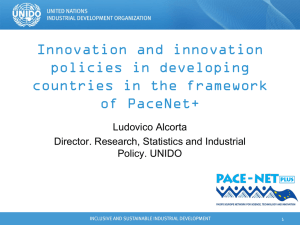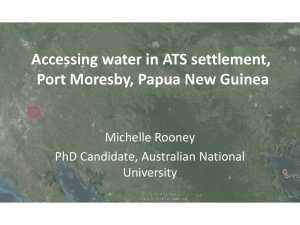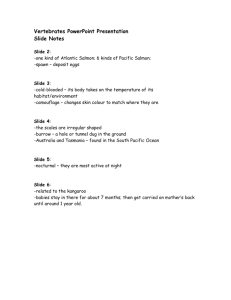Pacific Media Centre
advertisement
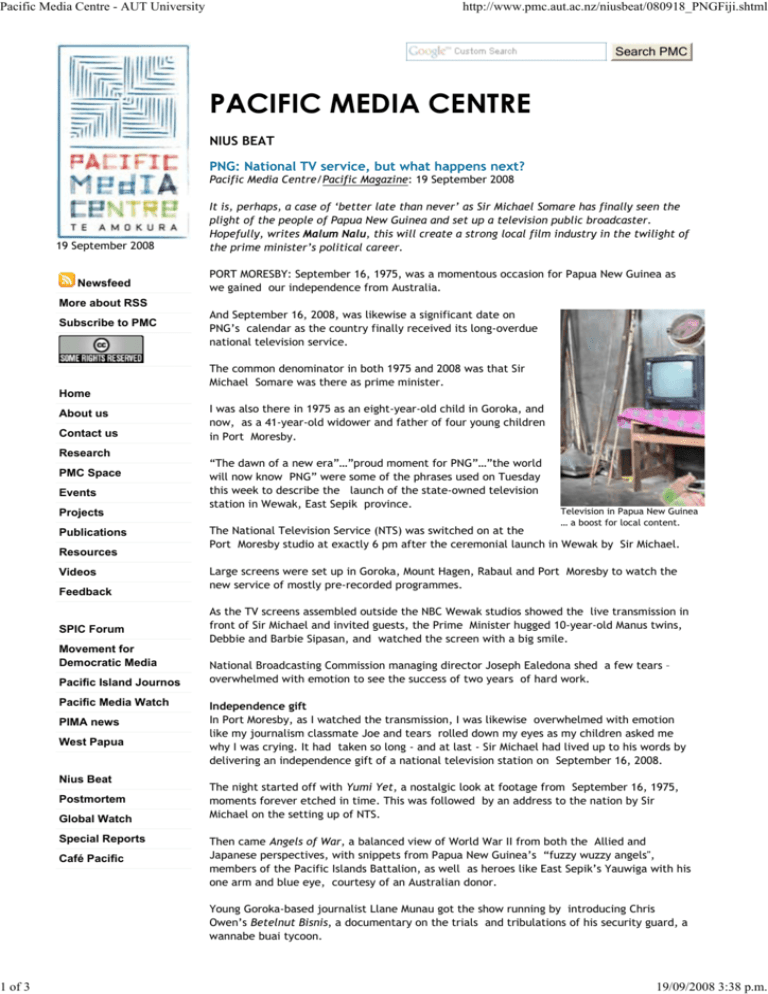
Pacific Media Centre - AUT University 1 of 3 http://www.pmc.aut.ac.nz/niusbeat/080918_PNGFiji.shtml Search PMC PACIFIC MEDIA CENTRE NIUS BEAT PNG: National TV service, but what happens next? Pacific Media Centre/Pacific Magazine: 19 September 2008 19 September 2008 Newsfeed More about RSS Subscribe to PMC It is, perhaps, a case of ‘better late than never’ as Sir Michael Somare has finally seen the plight of the people of Papua New Guinea and set up a television public broadcaster. Hopefully, writes Malum Nalu, this will create a strong local film industry in the twilight of the prime minister’s political career. PORT MORESBY: September 16, 1975, was a momentous occasion for Papua New Guinea as we gained our independence from Australia. And September 16, 2008, was likewise a significant date on PNG’s calendar as the country finally received its long-overdue national television service. The common denominator in both 1975 and 2008 was that Sir Michael Somare was there as prime minister. Home About us Contact us Research PMC Space Events Projects Publications Resources Videos Feedback SPIC Forum Movement for Democratic Media Pacific Island Journos Pacific Media Watch PIMA news West Papua Nius Beat Postmortem Global Watch Special Reports Café Pacific I was also there in 1975 as an eight-year-old child in Goroka, and now, as a 41-year-old widower and father of four young children in Port Moresby. “The dawn of a new era”…”proud moment for PNG”…”the world will now know PNG” were some of the phrases used on Tuesday this week to describe the launch of the state-owned television station in Wewak, East Sepik province. Television in Papua New Guinea … a boost for local content. The National Television Service (NTS) was switched on at the Port Moresby studio at exactly 6 pm after the ceremonial launch in Wewak by Sir Michael. Large screens were set up in Goroka, Mount Hagen, Rabaul and Port Moresby to watch the new service of mostly pre-recorded programmes. As the TV screens assembled outside the NBC Wewak studios showed the live transmission in front of Sir Michael and invited guests, the Prime Minister hugged 10-year-old Manus twins, Debbie and Barbie Sipasan, and watched the screen with a big smile. National Broadcasting Commission managing director Joseph Ealedona shed a few tears – overwhelmed with emotion to see the success of two years of hard work. Independence gift In Port Moresby, as I watched the transmission, I was likewise overwhelmed with emotion like my journalism classmate Joe and tears rolled down my eyes as my children asked me why I was crying. It had taken so long - and at last - Sir Michael had lived up to his words by delivering an independence gift of a national television station on September 16, 2008. The night started off with Yumi Yet, a nostalgic look at footage from September 16, 1975, moments forever etched in time. This was followed by an address to the nation by Sir Michael on the setting up of NTS. Then came Angels of War, a balanced view of World War II from both the Allied and Japanese perspectives, with snippets from Papua New Guinea’s “fuzzy wuzzy angels", members of the Pacific Islands Battalion, as well as heroes like East Sepik’s Yauwiga with his one arm and blue eye, courtesy of an Australian donor. Young Goroka-based journalist Llane Munau got the show running by introducing Chris Owen’s Betelnut Bisnis, a documentary on the trials and tribulations of his security guard, a wannabe buai tycoon. 19/09/2008 3:38 p.m. Pacific Media Centre - AUT University 2 of 3 http://www.pmc.aut.ac.nz/niusbeat/080918_PNGFiji.shtml The night ended off with Tin Pis Ran, starring my old Lae buddy and ex Aiyura National High School schoolmate Oscar Wanu, a skit on the adventures of an old man, his offsider, his daughter and his happy-go-lucky PMV truck. Communications Minister Patrick Tammur pulled down the curtain on a fine night of entertainment by committing the station to a lot of local content. I asked myself, after watching all the PNG content, why we don’t have a viable film industry in the country after all these years. EMTV also had the opportunity to promote local content for more than 20 years but failed miserably. These days, with the advent of television, video, VCDs and the internet, the movie projector has become as antiquated as the time-honored typewriter. Couch potatoes Kids today have become virtual couch potatoes, intoxicated by daily doses of foreign programs like Neighbours, Bay Watch and Mr Bean. The 1970s that I grew up in was an epoch of PNG classics such as Wokabaut Bilong Tonten, Marabe, and the later Tukana: Husat I Asua, to name but a few. Documentaries such as First Contact, Shark Callers of Kontu, the satirical Cannibal Tours and Trobriand Cricket won acclaim both here and overseas. There were also local productions on the likes of agriculture, health, family planning and small business – seemingly destined for greatness. The missionary zeal of the now-defunct Office of Information needs to be rekindled. In those days, officers carried projectors to rural areas and showed development films, meaning that people actually participated in development. When the government abolished the OI, PNG started having problems because information on development wasn’t getting out to the people, particularly the vast majority in the rural areas. Sadly, as is the case with most things in PNG since September 16, 1975, things have fallen along the wayside. In 2000, I wrote a series of articles for The National out of Goroka for PNG’s silver jubilee, one of which was an interview with local filmmaker Rodney Sinaune: “If the government seriously looks at the importance of this industry, it will help a lot in the development process. “People will be educated if we use the mass media; they will become equal partners in development. There have been many productions made about PNG (by expatriates), but we are not supporting a local industry. “People from overseas are gaining mileage out of us. We should have local content and participation. The need is there, the demand is there, but the government needs to give proper direction. “The government should also look at setting up another TV station, as there’s a lot of material being produced, but no medium over which to broadcast. “It should, perhaps, also look at the creation of a National Film Commission. “If the National Executive Council, through an Act of Parliament, creates a National Film Commission, everything will be alright. The film industry will also employ a lot of people. “The government, for far too long, has overlooked the industry. Bureaucratic red tape is also a big problem.” I know that film makers such as Sinaune, Chris Owens, Leonie Kanawi, Ignatius Talania, Baike Johnston, and many others, will finally breathe a sigh of relief with the setting up of NTS. It is, perhaps, a case of “better late than never” as Sir Michael has finally seen the plight of the people of this country and set up a TV station, which will also hopefully create a strong local film industry, in the twilight of his career. Malum Nalu is a Papua New Guinea journalist. This article was originally published in Pacific Magazine this week and 19/09/2008 3:38 p.m. Pacific Media Centre - AUT University 3 of 3 http://www.pmc.aut.ac.nz/niusbeat/080918_PNGFiji.shtml has been republished with permission.. Link Pacific Magazine Director: Associate Professor David Robie Contact: pmc@aut.ac.nz Creative Commons 2007-2008 Pacific Media Centre School of Communication Studies Pacific Media Centre is part of the Creative Industries Research Institute, AUT University AUT Copyright I Disclaimer 19/09/2008 3:38 p.m.
